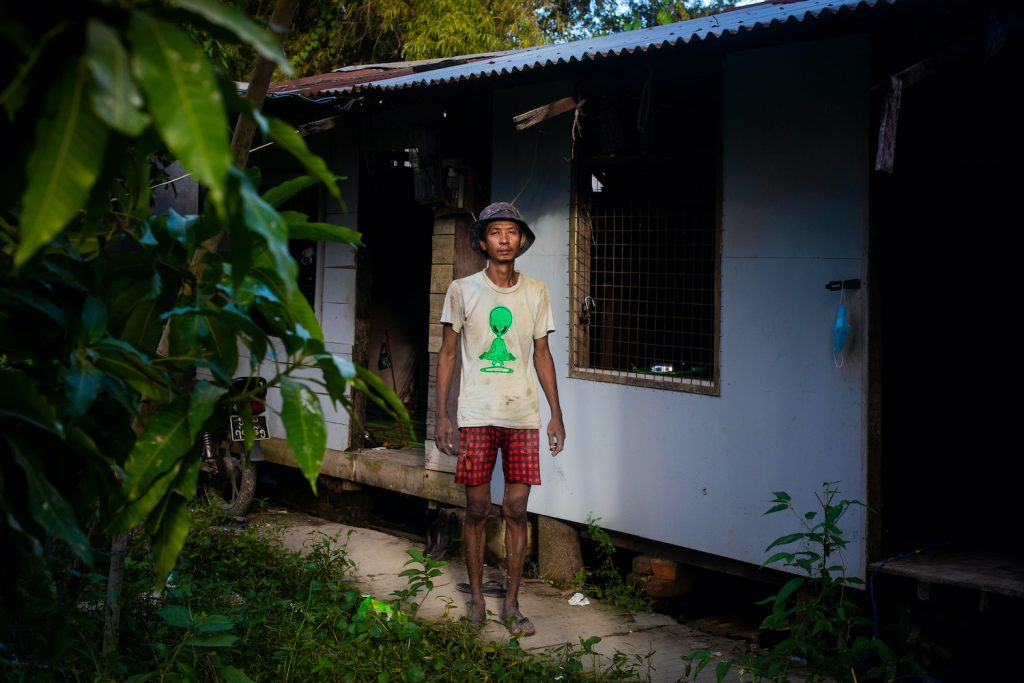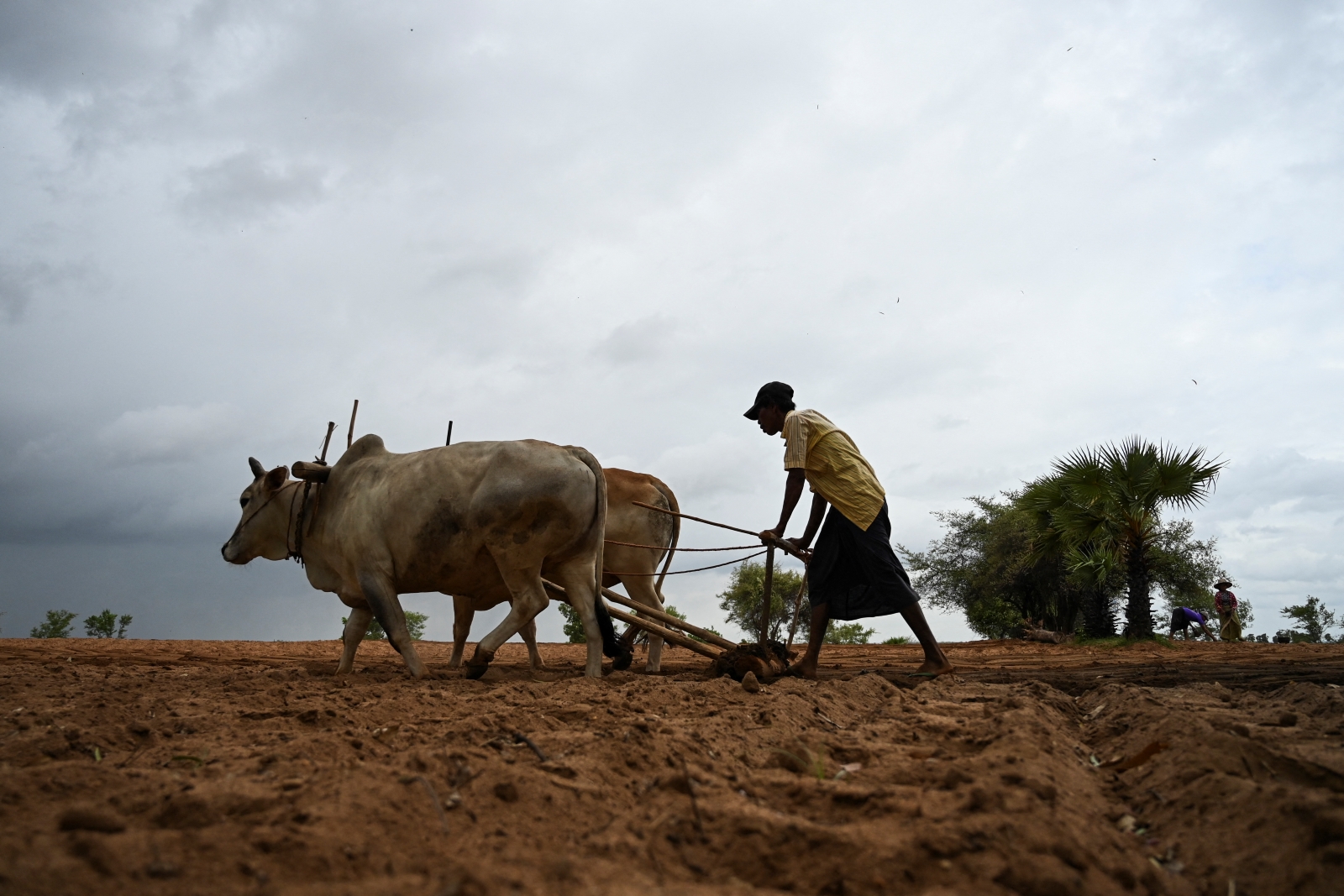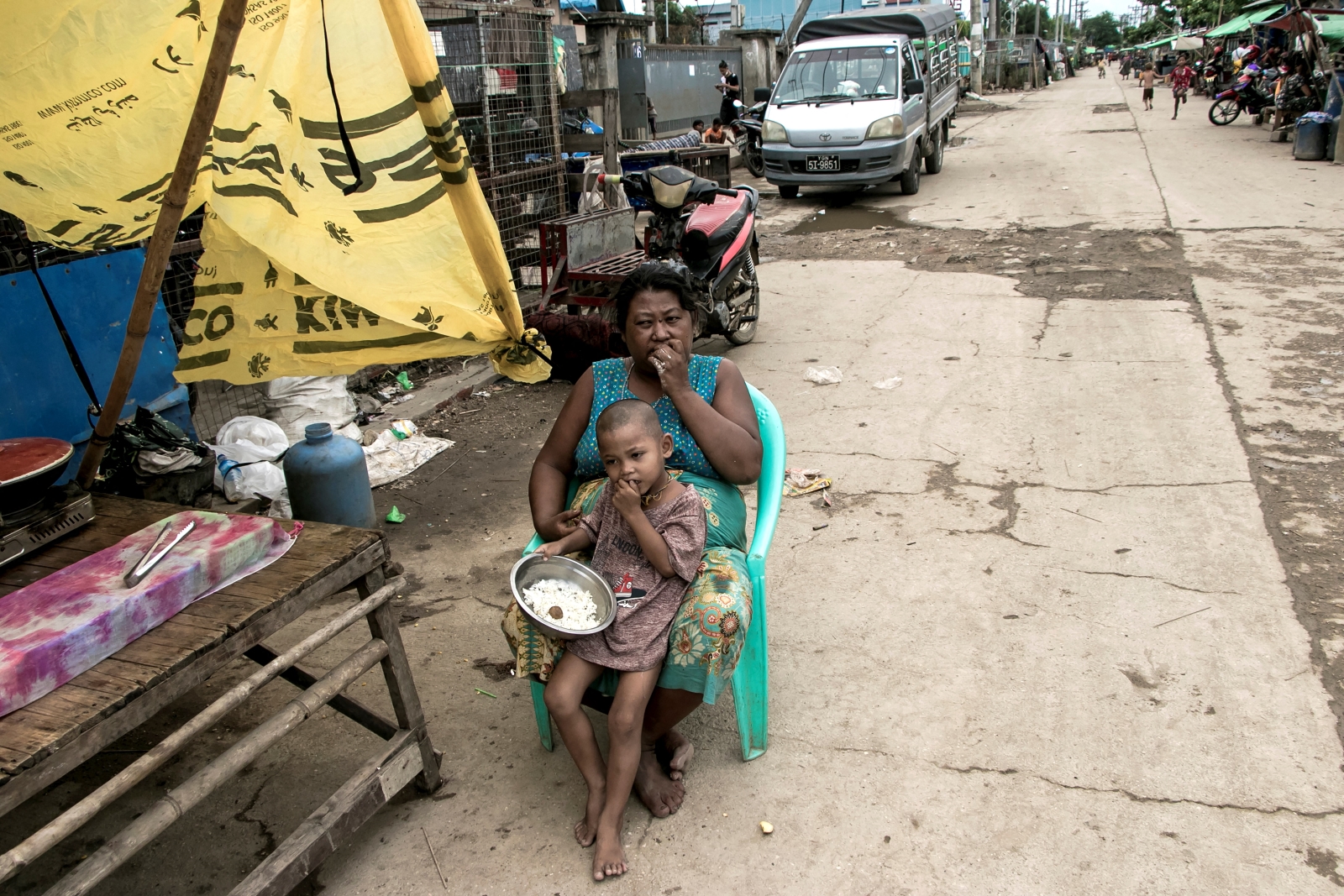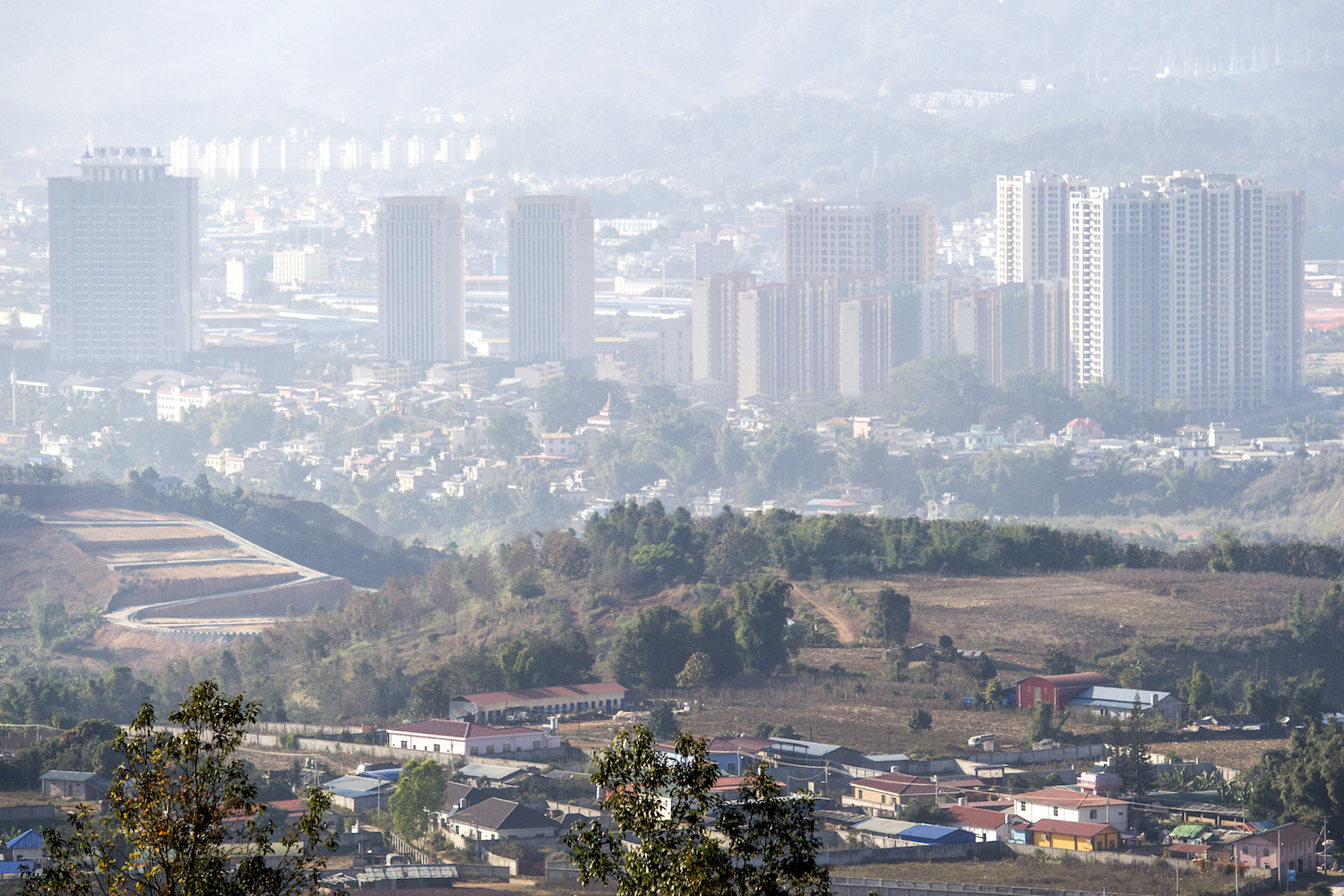Since health authorities introduced stay-at-home orders for Yangon in September, informal workers and small business owners have faced a grim struggle to make ends meet amid a lack of government assistance.
By HTIN LYNN AUNG | FRONTIER
U Aung Khant is only in his early 40s, but years of manual labour have left his skin weather-worn and darkened by the sun, giving him the appearance of a man well into his 50s.
Life has not been easy for Aung Khant, but it got a lot more difficult in September. As COVID-19 cases began to surge in the country’s largest city, Yangon, the Ministry of Health and Sports announced that residents of all mainland Yangon townships would be subject to stay-at-home orders, unless they worked in a handful of exempt sectors. As a result, the construction site where Aung Khant works was forced to close, leaving him with no income to support his family of six.
Even when he was working, and earning K13,000 a day, it was a struggle to pay the monthly rent of K150,000 on his Thaketa Township apartment and provide for everyone. Now, without work, he has had no choice but to borrow money to buy food.
“I can’t just sit and watch my family starve,” he told Frontier. “I had to borrow to buy basic food, such as rice, cooking oil, beans and potatoes.”
This recent debt is on top of the K400,000 he borrowed from his employer during the first wave of COVID-19 in April, when construction work also halted and he lost his job for six weeks.
Before September, Aung Khant had been repaying his April loan out of his daily wage; his employer would deduct between K5,000 and K6,000 a day. The balance wasn’t enough to cover daily living expenses, including utilities such as water and electricity, but his sister-in-law and brother were both working. Now they too are out of a job and despite living the most frugal of lives, the family owes K350,000 to his employer and other lenders. “Even though we steer clear of eating meat,” Aung Khant said. “We are sinking further into debt.”
While workers in the formal sector can access some benefits from the Social Security Fund, the stay-at-home order has created huge challenges for Aung Khant and his family, who are part of what’s known as the “precariat”: informal and casual workers who do not have a regular income.
The consequences can be tragic. On October 4, Yangon Region Hluttaw lawmaker U Nyi Nyi (National League for Democracy, South Dagon-1) posted on Facebook about the suicide of a young father in neighbouring Dagon Seikkan Township. The lawmaker wrote that his wife had been unable to feed their baby because of a health condition, but because he was unemployed the father could only afford to feed it non-dairy creamer. The baby developed an illness from the creamer and, after a fight with his wife, the man hanged himself.
Many more stories of extreme hardship and deprivation have emerged from Yangon, which has been under stay-at-home orders for almost six weeks.
The government has taken some steps to support low-income households since the COVID-19 pandemic emerged, providing a handout of five basic foods in April and distributing cash payments of K20,000 in July and August to around 5 million households. It is expected to provide another handout of basic commodities in the coming weeks, but township administrators say they do not yet know the details of the plan.
Although such support is unprecedented in Myanmar, the government has been criticised for not providing enough to low-income households given the sweeping scale of the stay-at-home orders and the general state of the economy.
Charity groups like We Love Yangon have tried to step into the breach, but they say they are struggling to meet even a fraction of the needs among low-income families in Yangon. In the second week of October, We Love Yangon began distributing packages containing rice, oil, canned fish and dry noodles to families in 40 townships.
Secretary U Zaw Win Khaing said seeing the level of poverty first-hand was an eye-opening experience. “It’s only because of COVID-19 that I realised how many low-income families and unemployed people there are,” he said, adding that the group had been receiving phone calls from desperate families in need of support. “We are trying to help them but our donation can’t really cover all their needs. I think the government will work to meet their needs.”
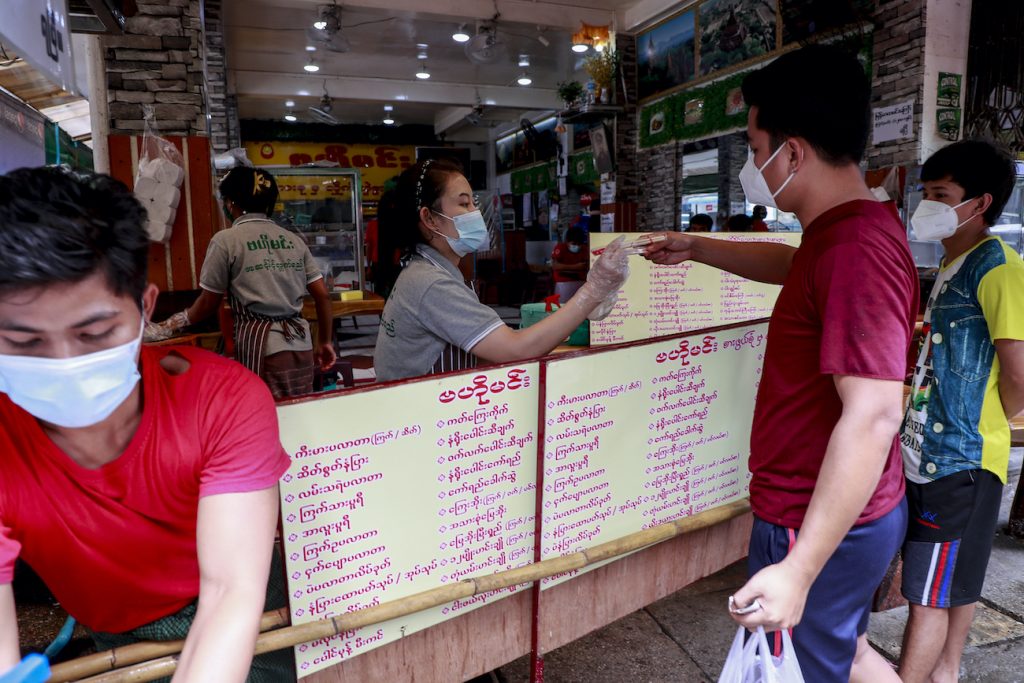
Nay Pyi Taw’s response has been hamstrung not only by budgetary constraints but also a lack of capacity to implement more complex support mechanisms. For its cash handouts, it used a crude set of criteria that meant many fell through the cracks. This includes Aung Khant and his family, who only moved to Yangon three years ago from Ayeyarwady Region’s Bogale Township.
“Because we are tenants, we are not registered in this ward on our household registration list, so we didn’t receive the cash handout,” he said.
He’s hopeful that he’ll receive the next handout, though. “We heard that everyone will receive it so we’ve put our names on the list. But I’m not sure what will happen.”
Aung Khant is far from alone in having incurred debts during the COVID-19 economic shutdown. Daw Soe Soe Yi, 47, has managed to avoid taking new loans, but is having trouble paying off her earlier debts to illegal money lenders.
Loan sharks charge usurious rates; the interest on a loan can be as much as 5 percent a day, and if an interest payment is missed, it is added to the total amount owed and can result in a ballooning debt that overwhelms the borrower.
This is precisely the scenario that Soe Soe Yi is facing. Around a year ago, her mother suffered a stroke and had to be hospitalised for 11 days. With no savings, Soe Soe Yi and her brother were forced to borrow K1.5 million to pay for her treatment.
Soe Soe Yi’s husband earns K10,000 a day as an informal worker at a salt factory in Dawbon Township, where they live rent-free in a company dormitory. His income is usually enough to support the family, and she has been working as a laundress – charging K120 for every garment she washes and irons – to try and pay off the debt.
Then along came COVID-19. Her husband hasn’t worked since September, when his factory closed down, and Soe Soe Yi’s income has been badly affected since the coronavirus emerged in Myanmar in March.
Previously, she travelled to the homes of clients in Sanchaung, Thingangyun and Dawbon to do their laundry, and also took in laundry to do at home. But since March, her work has dried up because clients worry she might inadvertently bring the virus into their home. Then once the second wave began, customers stopped sending laundry to her home; she now barely has any to do.
“Because of COVID-19 we no longer have work and I do not know how to pay the interest at the end of each day,” Soe Soe Yi said. “The interest rates were too high and the debt stands at K4 million. Two of the money lenders have suspended repayments, including interest, but I still owe K2 million.”
In the informal sector, it’s not just workers who are suffering. Many micro, small and medium-sized enterprises that are unregistered have been forced to close, depriving their owners of a livelihood.
Daw Khin Ohn Myaing, 60, runs a small construction materials business in Yangon’s Mingalar Taung Nyunt Township. She buys from large construction materials outlets and resells to construction sites in her neighbourhood, usually making around K6,000 to K12,000 a day.
Because the sale of construction materials was not exempt from the stay-at-home order, she had to shut her business on September 21. Khin Ohn Myaing doesn’t have to pay rent because she lives in her mother’s house with her two married daughters and their families, but the entire household relies on her income.
“It’s hard to make ends meet with the shop closed,” she said. “At my age, no one will employ me. How am I supposed to support myself, let alone pay for my 77-year-old mother’s medical costs?”
Khin Ohn Myaing said she had borrowed K200,000 from a microfinance company in January to buy sand and gravel from the sales centres and is due to repay the loan in December.
“Because businesses are closed, I’m worried about whether I’ll be able to pay it back,” she said. “My sons-in-law sometimes give us some money but I feel embarrassed to take it – I know they are struggling financially, too.”
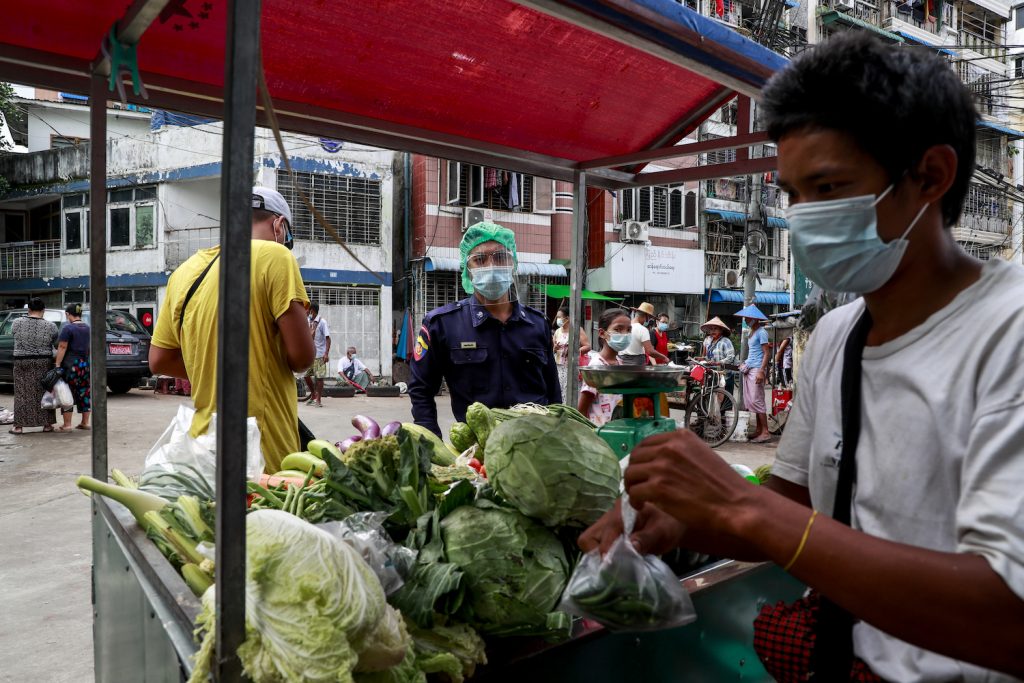
Workers in restaurants and teashops in Yangon Region have been particularly badly affected by the impact on the hospitality sector of limiting sales to take-away orders during both the first wave, from April to May, and the second wave since August.
Many eateries and teashops reacted to the take-away-only order by closing down.
Ko Tin Htay, 25, a native of Wakema in Ayeyarwady Region, is a cashier at the Aung Kaung San restaurant in Yangon’s Sanchaung Township. It suspended dine-in operations in the second week of September but he said the staff are fortunate to have a caring employer.
“Although I’m not paid a salary at the moment, our boss has continued to rent the restaurant and our hostel and he gives us pocket money to send to our parents,” Tin Htay told Frontier on October 2. “Our boss is spending K2 million a month to rent the restaurant and another K350,000 for our hostel. But take-away is not selling well and we feel a bit embarrassed about the situation.”
Before the restaurant closed, Tin Htay was being paid K200,000 a month, of which he sent K150,000 to his parents. “I think my parents understand the situation,” he added.
Daw Tin Moe Khine, 38, the proprietor of a teashop in Dawbon Township, is also struggling to stay afloat.
“Take-away is not selling well and the income barely covers the rent, but it’s a relief to have rented the teashop on a yearly contract,” Tin Moe Khine said.
She has managed to trim costs to K800,000 a month, down from K1.5 million, mainly by laying off four of her six workers. She’s not sure how long she’ll be able to keep paying her last two employees, a tea maker and a cook.
She’s also now running out of supplies and estimates she’ll need to invest K4 million to get her teashop back up and running for dine-in customers. “I’m not sure what I’ll do – I might have to try and borrow from relatives,” she said.
For all these struggling workers and business owners, the past week has brought some good news. From October 12, the government began allowing some “factories, workshops and workplaces” to reopen, provided they can pass a health inspection.
That day, Aung Khant was able to go back to his construction site. When Frontier spoke to him shortly afterward, he sounded relieved. “I’ll be able to feed my family well and no longer have to buy food on credit – these are the most important things for me,” he said. But he was also nervous about what the future might hold. He still owed hundreds of dollars, and his rent was due at the end of October. “I have to worry about that,” he said, “but at least I’m back at work. If I didn’t have a job, we’d be in huge trouble.”


